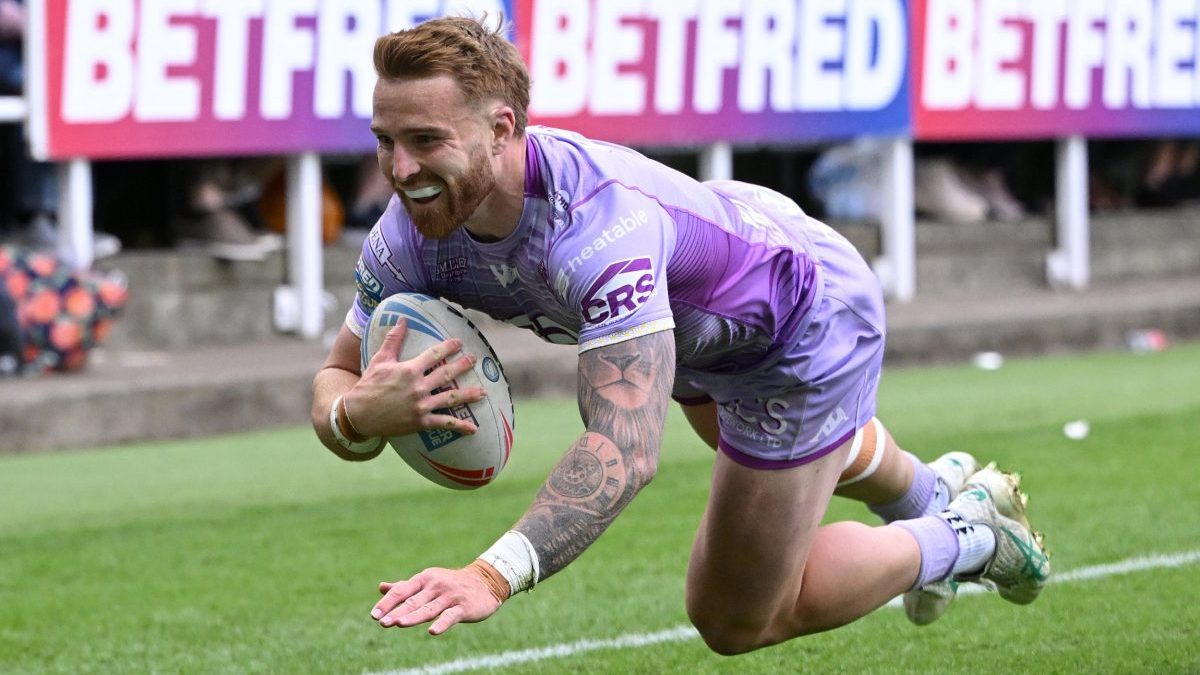Super League could expand to 20 clubs in the future as part of plans to revitalise the sport in the UK.
Slashing costs at the Rugby Football League (RFL) and regionalising the Challenge Cup are among the other targets identified in a strategic review led by the governing body’s controversial boss Nigel Wood.
Wood, who departed as RFL chief executive in 2018, was brought back to the top of rugby league in March after a coup led by Super League clubs Leigh Leopards, Leeds Rhinos and St Helens.
Wood has been installed as the chair of a new committee that includes Lord Jonathan Caine, Joanna Coates, Martin Coyd, Abi Ekoku, Dermot Power and Emma Rosewarne. He has also been appointed as senior executive director of the RFL and as chairman of Rugby League Commercial, after the RFL’s board was rocked by a series of resignations.
According to papers seen by The i Paper and circulated to clubs last month, Wood’s group has identified 13 key themes to focus on.
 Wigan Warriors were crowned Super League champions in 2024 (Photo: Getty)
Wigan Warriors were crowned Super League champions in 2024 (Photo: Getty)
It wants to see Super League “open to any number of full-time clubs, based on financial viability and player supply with ambitions to grow beyond 12 teams, potentially to 14, 16 or 20”.
On 28 July, nine clubs voted in support of expanding Super League to 14 teams next year, with two clubs voting against and one abstaining.
The committee stated that “overseas clubs can be included, as long as commercial terms are fair, sustainable and beneficial to the wider competition”, while also identifying a “need to innovate through new formats, events and locations that can unlock growth and expand the league’s reach.”
It added that “technology and storytelling must work together to deepen fan engagement, immerse audiences in the action and attract new, younger fans” and have also signalled the need to create a “club support unit” for business operations that is “a centralised growth and quality team to deliver quality and experience”.
The committee believes the Challenge Cup needs to be “rationalised and regionalised”, with a permanent date for the final and for Super League clubs to be seeded and drawn away from home on the round of entry. It has also noted the consideration of a “Magic Weekend-type event for the round of 16/8 creating a new event for broadcast and commercial revenue”.
Under plans, Championship and League 1 clubs “should be organised to present the most compelling calendar”, with a review of their central distribution to take place and a “harder” salary cap to be considered according to their income.
On the theme of governance, it outlined the need to “create a simplified, cost efficient centre delivering for members”, and to “ensure the sport has clear leadership with a voice that speaks for the whole sport”.
On player production, the committee wants to “enhance coach education at community level and strengthen links between community clubs and pathway clubs”, as well as “expand access to overseas players and expand squad sizes”.
It also signalled a need to further deregulate the temporary movement of players and to focus on fewer higher quality academies in the future.
On the international front, the committee recommended staging annual autumn international fixtures and to “introduce an annual international club competition”.
It includes an intention to seek an agreement to a 10-year World Club Challenge with the NRL, and to “seek alignment to the NRL to demonstrate a long-term commitment to rugby league in the northern hemisphere”.
On broadcast and the season schedule, Wood’s committee included a desire to schedule matches to align with peak viewership times and to leverage the sport’s streaming offering Super League+ as a “new revenue-generating platform”.
The plan also notes the need to “develop an on and off-field ecosystem to elevate the fan experience, increase access to behind the scenes content” and to “expand the use of digital streaming and AI to deepen fan connection and engagement”.
A ”specialised expert group” is to be established to conduct a review of the women’s game and changes have been advocated in the men’s game to “improve competitiveness, simplify the game, reduce match official influence” and to “streamline disciplinary panels to keep more players on the field, ensure safety and reduce inconsistency”.
Wood’s committee has given the month of September to implement and prioritise its themes, and by December to finalise its report.
The i Paper understands the 13-point plan was presented to clubs by Jason Harborow, a former RFL executive who has joined Wood’s group. Harborow was the operations director of the 2000 Rugby League World Cup and spent nearly five years as chief executive of the Liverpool Culture Company.
Insiders have slammed the 13-point plan as “embarrassing”. One told The i Paper: “It’s like a child’s wish list if money was no object. There is no supporting evidence, data or substance whatsoever”.
A RFL spokesperson said: “The main agenda item for the July meeting of the Rugby League Council was a presentation from the Strategic Review Sub-Committee, which had been formed at the request of the clubs and charged with a thorough review of the sport.
“The presentation was positively received, underlining the depth and breadth of the work that had already been done – and also the amount still to be done. These ideas have already been developed in further meetings with the Super League, Championship and League One clubs, and the work will continue for the rest of this year until the next full Council meeting in December.”
